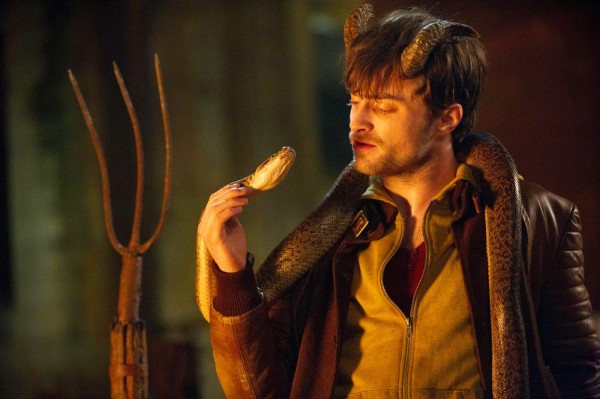The Film: Horns
The Director: Alexandre Aja
The Writers: Keith Bunin (Screenplay), Joe Hill (Novel)
The Actors: Daniel Radcliffe, Juno Temple, Heather Graham, James Remar, David Morse, Kathleen Quinlan, Max Minghella and Sabrina Carpenter.
Running Time: 120 min
US Release Date: October 31st, 2014
Horns is what you might call, “execution dependent.” It’s the story of Ig Perrish and his girlfriend Merrin. She’s murdered on the night his marriage proposal to her goes terribly, publicly wrong and everyone in the town naturally suspects that he’s responsible. And then Ig starts growing horns. Everyone seems to notice the horns, but they don’t make a huge deal of it it. Instead, they start acting on their worst impulses whenever Ig is around, telling him their deepest, darkest secrets in the process. Eventually, Ig embraces his strange new powers and uses them to find Merrin’s killer.
As hooks go, that’s a pretty fun one and plenty of people have sworn by Joe Hill’s book(s). So why is the film so muddled? It takes stabs at humor, melodrama and straight horror, but nothing works as well as it should. And seriously, it should! But the gimmick of people acting under the influence of Ig’s horns is handled in the most straight ahead way possible. I know that sounds ridiculous, but this isn’t so different from a movie like What Women Want, or any other story where some guy can read your mind. We’ve seen this before, despite the cosmetic differences between this and other stories of its type. The young mom with the screaming kid secretly…hates her kid. The town doctor…has an addiction to pills. The town cops…are secretly gay for each other. It’s paint-by-numbers, easy lay-up stuff and I couldn’t wait to move along to something more interesting.
So then we get the drama! Hey, hearing the secret things your family, friends, neighbors, etc. have always thought about you has excellent dramatic potential too, right? Yeah, in theory, it really does. In practice, we get to the most difficult truth of the film: the acting is all over the place. When Ig encounters his mom (Kathleen Quinlan) and she tells him how much she just wants him to go away and says, “I don’t want you to be my son anymore, okay?” the moment just lays there. Maybe I’m spoiled on television that wrings the characters (and viewers) dry with the dramatic potential of any given scene (e.g. Skyler White is worried that her husband might be in danger and confronts him about it…). On paper, some of the things said to Ig would be life altering and there’s a different kind of existential horror that could come from knowing, not only that you’re alone now, but that you’ve always been alone. But the movie never gets there.
There’s something similarly true of the straight horror. The story flirts with a concept Hill’s dad (Stephen King) fits into a lot of his work: a town going crazy or a rotten patch of land that gets into the marrow of the people living there. It’s an old horror trope that works well to this day. In Horns, Ig has a degree of mind control—he suggests that people beat each other up and they do it—and again, that’s got a lot of potential as an idea, but Alexandre Aja’s direction leans too heavily on the side of comedy. Again, it feels like more a lack of imagination or connection with the material than anything else. The themes are there. The town is being ripped apart by the murder of this young woman and they literally start ripping each other apart, burning the town to the ground. It’s writ large, obvious stuff and I can see how Aja might have mistaken some of those moments as comedy, but he spends so much time in that mode, the audience never gets the nightmare it deserves.
Most disappointingly, this is a “women in refrigerators” movie. Merrin’s story only matters in the context of Ig’s grief over her death and that’s a big problem. We get to know the relationship through a series of flashbacks, but Merrin remains an at-arms-distance cypher for all things good and beautiful in the world. She’s selfless because she has no “self.” It should be said, Juno Temple does good work here, but she’s asked to do some completely obnoxious shit. I mean, she dances in front of a magic-hour setting sun in a see-through dress. What was that moment in her life supposed to be? A future memory for her grief stricken boyfriend to dwell on to fuel his sorrow. Fucking please!
Ultimately, I’m not as morally troubled by the film as I am bored by it. Alexandre Aja made the most entertaining film of his career with Piranha 3D, a film with a clear vision and grasp on its own ridiculousness. And while I’d still count Mirrors as his personal worst, this is perhaps his most disappointing. It’s dull, obvious and at two hours, a slog. If you can’t guess who the killer is by the twenty minute mark, you’ve already fallen asleep.
